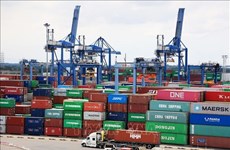Reduction of corporate income tax proposed
 Illustrative image (Source: VNA)
Illustrative image (Source: VNA)Hanoi (VNA) - Experts say the Ministry of Finance’s proposal to reduce corporate income tax for small and medium enterprises from 20percent to 15-17 percent is appropriate. However, there is a question that the incentives for small and medium-sized businesses may hinder them from growing up.
Increase revenue
Assessing the proposal of the Ministry of Finance, Le Xuan Truong, Head of Tax and Customs Department (Academy of Finance) pointed out that the Law on Supporting Small and Medium Enterprises that comes into effect on January 1, 1996, stipulates that SMEs are entitled to lower corporate income tax than average level. According to him, the proposal is suitable and necessary.
This means it is necessary to amend the Tax Law in order to make the Law on Supporting Small and Medium-sized Enterprises effective and practical. "Otherwise, the provisions in the Law on Supporting Small and Medium Enterprises are pointless," Truong said.
On the other hand, in practice, small and medium-sized enterprises are small, facing many disadvantages compared to large enterprises. Meanwhile, almost all Vietnamese businesses are small and medium-sized, contributing greatly to the economy. Therefore, stimulating them is a move of significance in economic development.
According to Nguyen Duc Kien, Vice Chairman of the National Assembly’s Economic Committee, 97 percent of the 700,000 enterprises registered and operating in Vietnam are small and medium-sized ones.
From an enterprise perspective, To Hoai Nam, Vice President and General Secretary of Vietnam Association of Small and Medium Enterprises (VINASME) said that the reduction of corporate income tax will beef up this target group, helping them have an additional amount of capital.
Contributing more ideas, expert Le Xuan Truong said that the tax reduction for small and medium enterprises is also the practice of some countries such as the Republic of Korea and Japan.
Enjoying incentives, small businesses refuse to grow?
On the other hand, the question is whether the tax incentives for small and medium enterprises will lead to the fact that they refuse to grow in order to enjoy low tax rates?
As for Mr. Le Xuan Truong, there is no need to worry about the SMEs refusing to grow up.
According to him, for the businessmen, the ultimate goal is profit, so there will be no such thing that small and medium sized businesses refuse to grow and develop.
The enterprise itself must be large in order to participate in large projects that bring about profits.
"Small but not highly profitable. On the contrary, if businesses scale up, pay more taxes and earn bigger profits, they must be big," he said.
Economist Nguyen Minh Phong said that the authorities need to publicize all businesses subjects to tax reduction as well as related processes and procedures.
He also emphasized the requirement to the authorities to receive reviews and complaints from businesses in the implementation of preferential policies, to mobilize the public to participate in social supervision.
Previously, the proposal of reducing from the current 20 percent to 15-17 percent was raised by the Ministry of Finance in the "Draft report to the Government on the construction of the National Assembly's Resolution project on a number of corporate income tax policies for supporting businesses, developing small and medium enterprises."
According to the proposal, the tax rate of 15 percent is applicable to enterprises with an annual turnover of less than 3 billion VND and no more than 10 employees per year participating in social insurance.
The tax rate of 17 percent applies to enterprises with an annual turnover of between 3 billion VND and under 50 billion VND and those that have no more than 100 employees participating in social insurance of./.













